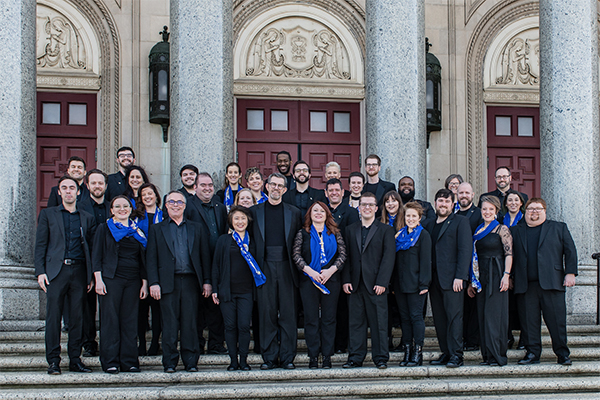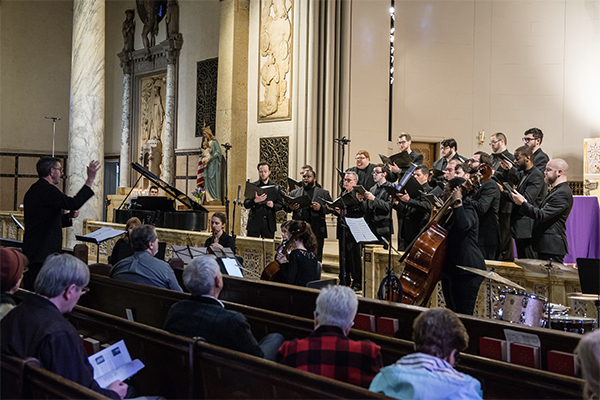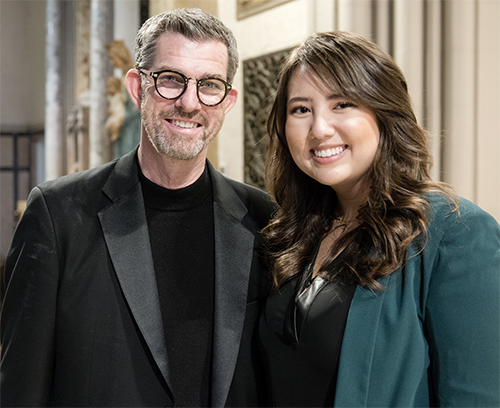by Mike Telin

The genius of “We March On!” was the combination of the research that went into its creation — each musical selection was introduced through spoken-word commentary — and the music itself. The program highlighted events of our time in choral music of our time: all but one of the composers represented are still alive. And each section of the program flowed easily from one to another. Nothing was forced, but rather meticulously placed.
Above all, the Cleveland Chamber Choir, under the direction of Scott MacPherson, sounded magnificent. The balances and blend he drew from the ensemble along with their impeccable diction — you could understand every word — made the performance a feast for the ears.

The Montgomery Bus Boycott was brought to life through the words of the bus driver (“I was only doing my job”), followed by the words of Rosa Parks (“I was tired of giving in”). That led to Catherine Dalton’s She Stood for Freedom, featuring the mellow voice of mezzo-soprano Teagan Amey. The captivating work celebrates both Parks and suffragist Alice Paul. Another Dalton composition, Morning Paper, featuring soprano Marie Taylor, inventively weaves together headlines about the Kent tragedy, the opioid crisis, the shooting of Tamir Rice, and the killing of eleven people at Pittsburgh’s Tree of Life Synagogue.
Choir member Julie Strebler led the audience in sing-alongs during Abbie Betinis’ “Resilience” and later “Love Is Love Is Love Is Love” from the Justice Choir Songbook, which added the spirit of a community social justice gathering to the concert. Prior to Love Is, which is dedicated to the victims of the Pulse nightclub, a reading from a Ravenna, Ohio newspaper (“But if this is what it takes to teach the students a lesson”) reminded us that not everyone was against the actions of the National Guard on May 4, 1970.
Leena Julin’s Real Solidarity, set to the text of The Schuman Declaration, is a grab-bag of musical styles, and the Choir sang the short work with conviction. The women of the ensemble were featured in Ethyl Smyth’s women’s suffrage-themed “Laggard Dawn” and “The March of the Women” from Songs of Sunrise. Both were performed with exuberance.

Joel Thompson’s Seven Last Words of the Unarmed looks a troubling subject straight in the eye. Scored for male voices and string quintet, Thompson’s work vividly sets the final words of seven victims of police brutality. And while it is not possible for us to know the pain they endured, the ensemble’s moving performance delivered that feeling directly to the audience.
You could hear Kenneth Chamberlain pleading, “Officers, why do you have your guns out?”; Trayvon Martin asking, “What are you following me for?”; Amadou Diallo telling his mother that he is going to college (tenderly delivered by tenor Matt Jones), Michael Brown shouting in desperation, “I don’t have a gun”; Oscar Grant crying out, “You shot me”; John Crawford telling the police, “It’s not real”; and Eric Garner’s painful “I can’t breathe.”

Photos by Elisa Vietri.
Published on ClevelandClassical.com March 17, 2020.
Click here for a printable copy of this article


